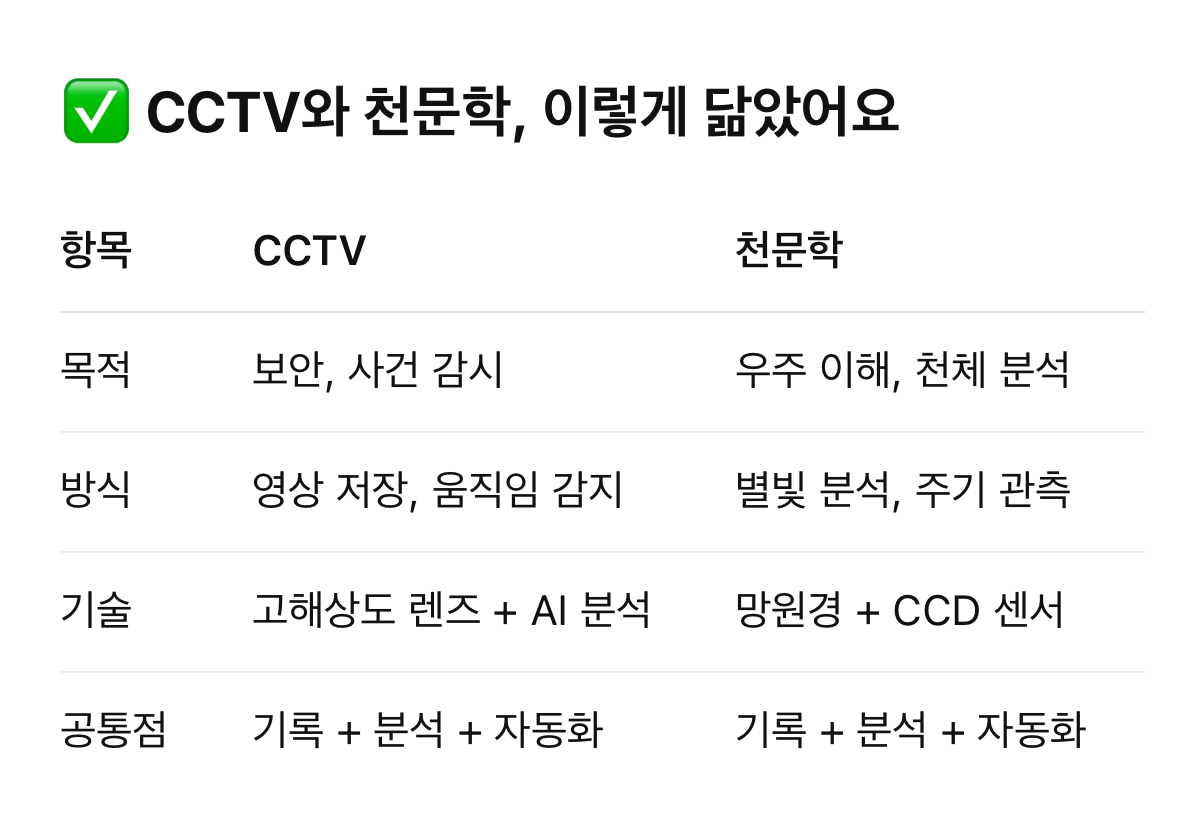천문학자는 별을 관측하고, CCTV는 사람을 관찰합니다.
둘 다 “보는 사람”이죠. 그것도 아주 오래, 아주 꾸준히.
이 둘은 완전히 다른 분야 같지만, 의외로 핵심 원리가 닮아 있습니다.
바로 지속적인 관찰과 기록, 그리고 데이터 분석.

예를 들어 CCTV는 건물 앞을 24시간 감시하면서 누가 드나드는지 기록합니다.
천문학자는 밤하늘을 24시간 지켜보며 별의 밝기나 움직임을 추적하죠.
다른 점은 관찰 대상이 다를 뿐, 구조는 놀랍도록 비슷합니다.
🔧 기술적으로도 접점이 있어요
1. CCD 센서
CCTV도, 천문학 망원경도 CCD(Charge-Coupled Device) 를 사용해요.
빛을 전기신호로 바꾸는 이 센서는, CCTV에서는 영상 저장에, 천문학에서는 별빛 감지에 쓰입니다.
2. AI 영상 분석
요즘 CCTV는 사람이 안 봐도, 움직임을 스스로 감지하죠.
천문학도 마찬가지. AI가 이상한 밝기 변화를 자동으로 분석해서 행성 통과나 블랙홀 활동을 탐지합니다.
3. 타임랩스 (Time-lapse)
CCTV 타임랩스 영상은 하루치를 몇 초 만에 보여주죠.
천문학도 별의 움직임을 타임랩스로 시각화해서 분석합니다.
별이 도는 듯한 영상, 다들 한 번쯤 봤을 거예요.
🌍 천문학자는 혼자 관측하지 않아요
사실 천문학자는 우주의 CCTV 관리자가 아니라,
전 세계가 연결된 하나의 모니터링 팀의 일부입니다.
예를 들어 IAU(국제천문연맹) 은 각 나라의 관측소가 수집한 데이터를 함께 공유하며,
하나의 별빛 변화나 외계 행성의 통과 기록을 위해 수십 개국 천문학자들이 함께 분석합니다.
심지어 한 나라가 낮일 때, 다른 나라의 천문대가 밤하늘을 대신 관측하죠.
이건 CCTV로 말하자면 24시간 교대 근무 시스템인 셈이에요.
누군가는 항상 지켜보고, 누군가는 그 기록을 분석합니다.
한국의 관측 장비로 시작된 데이터가
미국의 슈퍼컴퓨터에서 계산되고,
유럽의 천체 물리 이론과
일본의 시뮬레이션이 연결되는 거죠.
📡 우주의 보안 시스템?
결국 천문학도 하나의 거대한 감시망이에요.
단지 목적이 ‘범인 추적’이 아니라
우주의 비밀을 밝히는 것일 뿐이죠.
관찰하고, 분석하고, 연결하고.
모든 것은 데이터에서 시작합니다.
🏙️ 한국의 CCTV, 하늘을 닮다?
우리나라만큼 CCTV가 잘 설치된 나라도 드뭅니다.
골목마다, 건물마다, 심지어 공원에도 지켜보는 눈이 있죠.
범죄 예방뿐 아니라, 실시간 교통 관제, 재난 감시, 도시 열지도 분석에도 쓰입니다.
천문학도 비슷합니다.
하늘을 향한 카메라가 늘어나면서
지구 곳곳에서 우주 날씨, 소행성 경로, 오로라 변화 같은 데이터를
실시간으로 수집하게 되었죠.
한 마디로,
도시는 CCTV로 세상을 기록하고,
천문학은 망원경으로 우주를 기록합니다.
🌌 한 줄 요약
CCTV는 도시를 지키는 눈이고,
천문학은 별을 지키는 눈이에요.
🔤 오늘의 음소 분석 (Phoneme Tips)
1. telescope /ˈtel.ə.skoʊp/
- 강세는 첫 음절 TEL, ‘스코프’의 [oʊ]는 길게 늘려서 발음.
2. surveillance /sɚˈveɪ.ləns/
- [veɪ] 부분은 **‘베이’**처럼 입을 벌려 정확히. 한국인에게 발음 어려움 주는 단어 중 하나.

🔭 CCTV and Astronomy — Not So Different After All?
Astronomers observe stars. CCTV watches people.
They’re both “watchers.” For a long time. Very consistently.
They may seem like completely different fields, but they surprisingly share a core principle:
continuous observation, recording, and data analysis.
📋 CCTV vs Astronomy —4 Key Comparison
1. 목적 (Purpose)
• CCTV: Security, event detection
• Astronomy: Understanding the universe, celestial research
2. 방식 (Method)
• CCTV: Video storage, motion detection
• Astronomy: Light analysis, cycle observation
3. 기술 (Tech)
• CCTV: High-res lens + AI analysis
• Astronomy: Telescope + CCD sensor
4. 공통점 (Common Ground)
• Both: Record + Analyze + Automate
For example, CCTV monitors the entrance of a building 24/7, recording who comes and goes.
Astronomers also observe the night sky around the clock, tracking star brightness and movement.
The subject differs, but the structure is surprisingly similar.
🔧 Shared Technologies
1. CCD Sensors
Both CCTV and telescopes use CCD (Charge-Coupled Device) sensors.
These convert light into electrical signals—for video in CCTV and starlight in astronomy.
2. AI Image Analysis
Modern CCTV doesn’t need a human watching all the time.
Likewise, AI in astronomy detects anomalies in brightness—like exoplanet transits or black hole activity.
3. Time-lapse Video
CCTV compresses a full day into seconds using time-lapse.
Astronomy uses the same technique to visualize star movement.
You’ve probably seen a video of stars rotating through the night sky!
🌍 Astronomers Don’t Observe Alone
In truth, astronomers are not lone stargazers.
They’re part of a global monitoring network.
Take the IAU (International Astronomical Union)—it coordinates data from observatories around the world.
Dozens of countries work together to analyze a single star’s brightness change or detect an exoplanet.
When one country is in daylight, another’s telescope observes the night sky.
It’s like a 24-hour CCTV rotation system—someone is always watching, someone is always analyzing.
Data captured by Korean equipment might be processed in an American supercomputer,
combined with European astrophysical theories,
and simulated using Japanese algorithms.
It’s the ultimate team science.
📡 A Security System for the Universe?
You could say astronomy is one giant surveillance net.
Not for catching criminals—but for uncovering the mysteries of space.
Observe. Analyze. Connect.
It all begins with data.
🏙️ Korea’s CCTV, Looking a Lot Like the Sky
Few countries have CCTV coverage as thorough as South Korea.
In every alley, on every building, even in public parks — there are always eyes watching.
It’s not just for crime prevention. CCTV is also used for real-time traffic control, disaster monitoring, and even urban heat map analysis.
Astronomy works in a similar way.
As more cameras are pointed toward the sky,
we’re now able to collect real-time data from across the globe —
on space weather, asteroid paths, and aurora activity.
Simply put,
cities record the world with CCTV,
and astronomy records the universe with telescopes.
🌌 In One Sentence
CCTV is the eye that guards our cities.
Astronomy is the eye that guards the stars.
#천문학 #CCTV기술 #우주관측 #AI분석 #망원경과센서 #별관측기술 #데이터기록 #감시기술비교 #과학콘텐츠 #수익형블로그과학